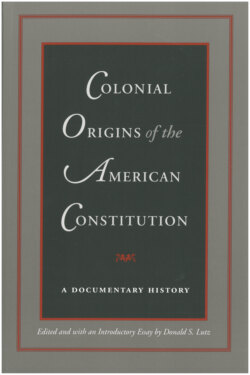Читать книгу Colonial Origins of the American Constitution - Группа авторов - Страница 14
На сайте Литреса книга снята с продажи.
Оглавление7
[The Watertown Covenant of July 30, 1630]
July 30, 1630
Strictly speaking the Watertown Covenant is a church covenant rather than a political one and was the first collective document made by the Watertown colonists. Those signing it understood the document to be establishing a church-state. Comparison with the Mayflower Compact illustrates how little difference was needed to make a church covenant a true political compact, and, as later compacts illustrate, how the move from church covenant to true political compact was both logical and straightforward.
Complete text, with original spelling, taken from Cotton Mather, Magnalia Christi Americana, bk. 3 (London, 1702), 83. For historical context one might consult Champlin Burrage, The Church Covenant Idea: Its Origin and Development (Philadelphia: American Baptist Publication Society, 1904).
We whose Names are hereto subscribed, having through God’s Mercy escaped out of Pollutions of the World, and been taken into the Society of his People, with all Thankfulness do hereby both with Heart and Hand acknowledge, That his Gracious Goodness, and Fatherly Care, towards us: And for further and more full Declaration thereof, to the present and future Ages, have undertaken (for the promoting of his Glory and the Churches Good, and the Honour of our Blessed Jesus, in our more full and free subjecting of our selves and ours, under his Gracious Government, in the Practice of, and Obedience unto all his Holy Ordinances and Orders, which he hath pleased to prescribe and impose upon us) a long and hazardous Voyage from East to West, from Old England in Europe, to New England in America that we may walk before him, and serve him, without Fear in Holiness and Righteousness, all the Days of our Lives: And being safely arrived here, and thus far onwards peaceably preserved by his special Providence, that we bring forth our Intentions into Actions, and perfect our Resolutions, in the Beginnings of some Just and Meet Executions; We have separated the Day above written from all other Services, and Dedicated it wholly to the Lord in Divine Employments, for a Day of Afflicting our Souls, and humbling our selves before the Lord, to seek him, and at his Hands, a Way to walk in, by Fasting and Prayer, that we might know what was Good in his Sight: And the Lord was intreated of us.
For in the End of the Day, after the finishing of our Publick Duties, we do all, before we depart, solemnly and with all our Hearts, personally, Man by Man for our selves and others (charging them before Christ and his Elect Angels, even them that are not here with us this Day, or are yet unborn, That they keep the Promise unblameably and faithfully unto the coming of our Lord Jesus) Promise, and enter into a sure Covenant with the Lord our God, and before him with one another, by Oath and serious Protestation made, to Renounce all Idolatry and Superstition, Will-Worship, all Humane Traditions and Inventions whatsoever, in the Worship of God; and forsaking all Evil Ways, do give ourselves wholly unto the Lord Jesus, to do him faithful Service, observing and keeping all his Statutes, Commands, and Ordinances, in all Matters concerning our Reformation; his Worship, Administrations, Ministry, and Government; and in the Carriage of our selves among our selves, and one another towards another, as he hath prescribed in his Holy Word. Further swearing to cleave unto that alone, and the true Sense and meaning thereof to the utmost of our Power, as unto the most clear Light and infallible Rule, and All-sufficient Canon, in all things that concern us in this our Way. In Witness of all, we do ex Animo, and in the presence of God, hereto set our Names, or Marks, in the Day and Year above written.
